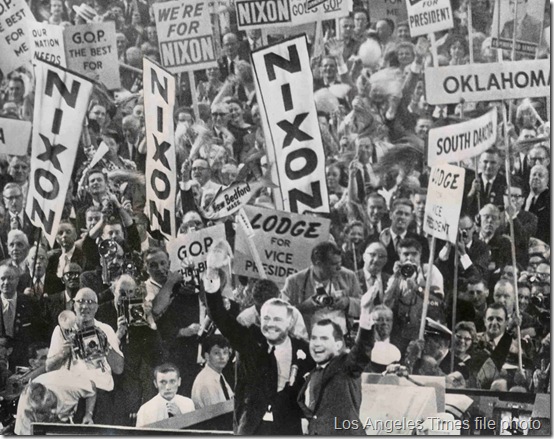Vice President Richard M. Nixon was nominated for president at the Republican National Convention in 1960, AP Images
Vice President Richard M. Nixon was nominated for president at the Republican National Convention in 1960 , AP Images

After the general election in 1960, the Democratic and Republican Party held their own National Conventions to determine their party's nominee to run for the Presidential Election. Delegates from their respective party gathered at each convention to vote through a series of primary elections and caucuses culminating in the 1960 Democratic National Convention and the 1960 Republican National Convention.
The Republican National Convention was held from July 25 to July 28, 1960, in Chicago, Illinois. During the 3 day event, delegates gathered to vote on the Republican Party's nominee. Richard M. Nixon entered the convention with virtually no opponent, with U.S. Senator Barry Goldwater of Arizona making a speech, removing himself from the race and asking for conservatives to "take back" the party. Nixon won easily, with 1,321 votes to 10 votes for Goldwater. After considering his vice presidency picks, he picked Senator Henry Cabot Lodge Jr as his running mate. At the convention, Nixon promised to visit every state in his campaign. 28% of households with televisions, during primetime hours, watched the RNC.
"And I urge you, study the records of the candidates, listen to my speeches and that of my opponent, and that of Mr. Lodge and that of his opponent. And then, after you have studied our records and listened to our speeches, decide -- decide on the basis of what we say and what we believe which is best qualified to lead America and the free world in this critical period."
~ Richard M. Nixon
The Democratic National Convention was held from July 11th to July 15th, 1960, in Los Angeles, California. John F. Kennedy entered the convention as the front runner for the Democratic nomination, needing 731 delegate votes to secure the nomination, but only having 600 some votes. The week before the convention, Kennedy received two new challenges, Lyndon B. Johnson, the Senate majority leader, and Adlai Stevenson II, the party's nominee in 1952 and 1956. On the third day of the convention, Kennedy gained a narrow majority on the first ballot, with his campaign manager and brother, Robert F. Kennedy, securing critical delegate votes at the last minute. The final tally of the vote showed the Kennedy won with 806 votes, with Lydon B. Johnson in second with 409 votes. John F. Kennedy selected Johnson as his running mate, interpreted as a move to hold the south over opposition to Kennedy's faith as a Catholic. In JFK's acceptance speech, he outlined his vision of "a new frontier". Nixon watched JFK's speech with two of the member of his campaign, with Nixon concluding the performance as "poor" and that he can beat Kennedy in proposed televised debates. 29.2% of households with televisions, during primetime hours, watched the DNC.
"That is the question of the New Frontier. That is the choice our nation must make--a choice that lies not merely between two men or two parties, but between the public interest and private comfort--between national greatness and national decline--between the fresh air of progress and the stale, dank atmosphere of 'normalcy'--between determined dedication and creeping mediocrity."
~ John F. Kennedy